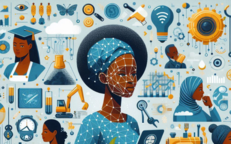Safeguarding Africa’s Water Resources By Leveraging Smart Water Meters Technology
This is the 11th post in a blog series to be published in 2023 by the APET Secretariat on behalf of the AU High-Level Panel on Emerging Technologies (APET) and the Calestous Juma Executive Dialogues (CJED)
Water is essential for human survival, and access to clean and safe drinking water is a fundamental human right. Unfortunately, Africa is facing a shortage of clean drinking water, which is only becoming more severe with time. Water scarcity is a growing problem that refers to the lack of access to sufficient water resources.[1] The United Nations has reported that water affects more than 2 billion people globally, and the number is expected to increase in the coming years. In Africa, the water scarcity issue is particularly severe, with up to 230 million Africans predicted to face water scarcity by 2025. Additionally, up to 460 million people are expected to reside in water-stressed areas, as the continent's population increases, and climate change continues to deplete the continent’s finite resources. The impact of water scarcity can be devastating, affecting agriculture, health, and other essential aspects of life.
The African Union Agenda 2063 recognises the importance of water sustainability as the top priority for the continent’s socio-economic development and growth.[2] The AU’s agenda emphasises the equitable and sustainable use, and management of water resources for socioeconomic growth, regional collaboration, and a better living environment.[3] The goal is to develop solutions that ensure that clean and safe drinking water is available to all Africans. The African Union's recognition of water as a means of attaining a better and habitable environment is critical to solving the water scarcity problem. The equitable and sustainable use and management of water resources are essential for ensuring that everyone has access to safe and clean drinking water. It is also vital for sustainable socio-economic development and regional cooperation.
There are two forms of water scarcity being experienced in Africa, physical and economic scarcity. Physical water scarcity is caused by climate change and includes phenomena like droughts and changes in weather patterns. Conversely, economic water scarcity arises due to institutional inadequacies such as insufficient planning, investment, and infrastructure.[4] Of these two forms, economic water scarcity is the more pressing concern as it is largely due to a lack of empathy. This type of water scarcity occurs when a population does not have the financial means to access sufficient water supplies. Poverty poses a significant barrier to access to water in Africa.
In most African countries, clean and safe water is delivered through piped water sources. This method of water delivery is preferred because it requires less time and physical effort to collect water, allowing individuals to be more productive in other areas of life. Additionally, piped water sources result in lower healthcare costs as individuals are less likely to get sick and incur medical expenses. Access to piped water sources can also lead to better health outcomes, which can, in turn, improve school attendance rates, especially for children who are particularly vulnerable to water-related diseases. Ultimately, the availability of piped water sources can have long-term positive effects on the lives of individuals and communities, particularly in areas with limited resources.
Despite the crucial role piped water plays in ensuring access to clean and safe water, over two-thirds of the African population lacks such access. The main reason behind this is the lack of adequate infrastructure with only 56% of urban residents in Africa having access to clean piped water. Outdated and insufficient water infrastructure leads to wastage of water, which limits its availability to communities, especially in areas where water shortage is common.[5] Most of the water wastage in urban areas is due to leakages from water pipes, geysers, and unregulated outdoor watering. The main challenge in water distribution is addressing these leakages, which result in low water pressure, erratic and insufficient water supply, as well as poor water service for customers.[6] Furthermore, leaks can lead to an increase in water bills and damage to housing infrastructure, besides contributing to the erratic water supply.
The African Union High-Level Panel on Emerging Technologies (APET) urges African countries to adopt smart water meters as part of their efforts to accelerate the adoption of emerging technologies. Smart water metres are devices that monitor and transmit water usage data from customers to suppliers, thereby improving water management and billing accuracy. Equipped with an electronic computing unit (ECU), these meters enable easier communication between customers and suppliers.
Smart water metres, enabled by the Internet of Things (IoT), provide users with the ability to monitor and track their water usage accurately and pay accordingly. This technology helps to reduce overall water distribution network losses by allowing utilities to monitor and control water demand more effectively. By managing demand, utility companies can use available water supplies more efficiently and predict when their supplies will run low, thereby allowing appropriate planning. This approach helps to ensure that everyone has access to sufficient and safe drinking water. Additionally, IoT smart meters can detect water wastage by identifying any damage to water pipes or lines. By using sensors to detect water leaks, these smart meters help water utility companies to minimise wastage quickly and remotely by stopping the flow.
APET posits that one of the key advantages of smart water meter technology is its ability to detect leakages in water pipes promptly. By identifying and addressing leaks early, water contamination can be prevented, thereby ensuring that the water supplied remains safe for consumption. For instance, in the town of Shinyalu in Kenya, the implementation of smart water meters helped identify and repair leakages, thereby safeguarding the water quality and making it more readily available for the local community.
Smart water meters allow consumers to pay for the exact amount of water they use. These meters have also played a crucial role in reducing non-revenue water losses, which occur when water is lost before it reaches the consumers due to theft, leaks, or inaccurate billing. By accurately measuring water consumption and facilitating fair billing, utilities can collect sufficient revenue to invest in infrastructure upgrades. In Kenya, the Nairobi City Water & Sewerage Company (NCWSC) and Nakuru Water and Sanitation Services Company (NAWASSCO) have embraced smart water meters, resulting in improved billing, revenue collection, and reduced water waste from leaks.[7]
Figure 1: NCWSC meter reading service
Smart water meter technology has also significantly improved the efficiency of water utility companies in providing reliable water supply to consumers. By monitoring water usage and detecting leaks in real-time, utility companies can optimise their water distribution networks, reduce water wastage, and ensure a more reliable water supply. For example, the City of Cape Town in South Africa successfully implemented smart water metering systems during a severe drought, which helped conserve water by alerting consumers to their water usage patterns and encouraging responsible water consumption. As a result, the city was able to reduce its water consumption and avoid running out of water entirely.
APET observes that smart water meter technology is revolutionising water management across the African continent. By detecting leakages, preventing water contamination, improving revenue collection, and enhancing water supply, these innovative devices are transforming the way water is distributed and consumed. Case studies from Kenya and South Africa demonstrate the benefits of smart water meters, including improved billing accuracy, increased revenue, conservation efforts, and greater water sustainability. APET opines that as African countries continue to adopt and expand smart water metering systems, there will be improved water management, enhanced access to clean water, and a more sustainable future for African communities.
In conclusion, the adoption of smart water meters in water management is a significant step towards improving access to clean water, especially for low-income households. This technology has the potential to help utilities reduce non-revenue water losses and improve billing and revenue collection. It also enables real-time water demand monitoring across the supply area, supporting preventive planning and water conservation efforts. As more African countries and utilities adopt this technology, it is expected that the challenges of water scarcity and management will be better addressed, leading to improved access to clean and safe water for everyone.
Featured Bloggers – APET Secretariat
Aggrey Ambali
Justina Dugbazah
Barbara Glover
Bhekani Mbuli
Chifundo Kungade
Nhlawulo Shikwambane
[1] https://www.globalcitizen.org/en/content/water-scarcity-in-africa-explainer-what-to-know/.
[2] https://www.youtube.com/watch?v=TsDdtkvtay0.
[3]https://au.int/en/pressreleases/20160317.
[4] https://www.globalcitizen.org/en/content/water-scarcity-in-africa-explainer-what-to-know/.
[5] https://byjus.com/biology/effects-of-wastage-of-water/#:~:text=Wasting%20water%20may%20limit%20its,plants%20to%20treat%20wasted%20water.
[6]https://www.researchgate.net/publication/341358267_THE_CONTRIBUTION_OF_LEAKAGE_WATER_TO_TOTAL_WATER_LOSS_IN_HARARE_ZIMBABWE.
[7] https://journals.openedition.org/factsreports/6372.


